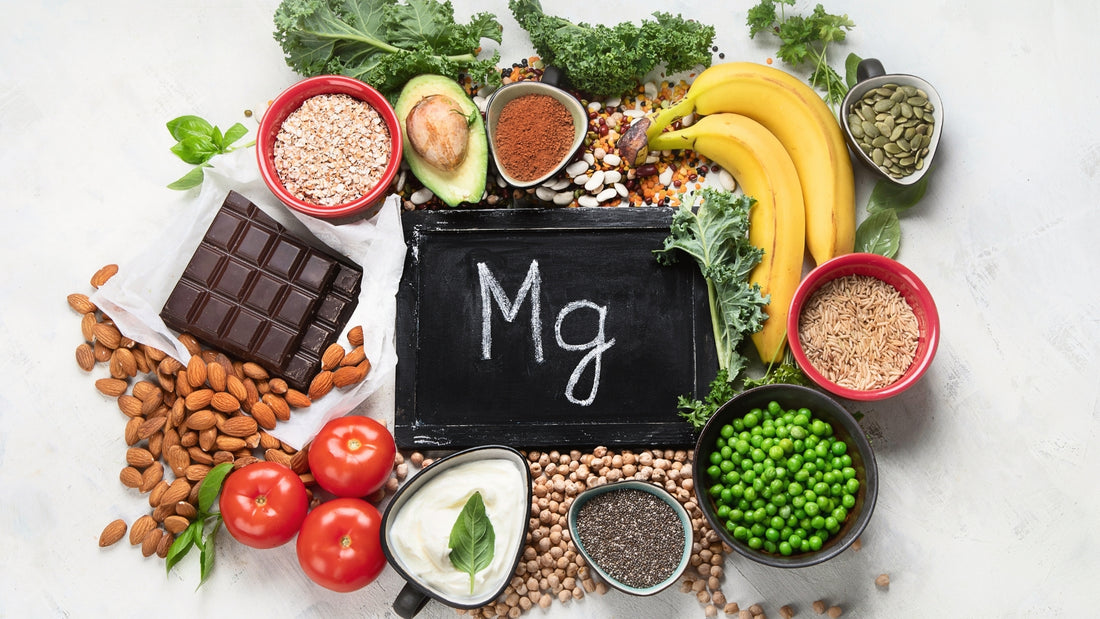
Foods that Meet All Your Magnesium Needs in 1 Month
Share
There are several important reasons why the body needs magnesium. Magnesium is essential for the functioning of more than 300 enzyme systems in the human body and has an important role in many vital physiological functions. Here are some key reasons why the body needs magnesium: Magnesium plays a critical role in the production of ATP (adenosine triphosphate). ATP is an essential molecule for cells to store and use energy. Magnesium binds to ATP molecules to form the biologically active form of ATP.
Magnesium ensures proper functioning of nerve cells and plays an important role in nerve conduction. It also helps muscle relaxation by preventing overstimulation of the nervous system.
Magnesium helps muscles contract and relax properly. This mineral works with calcium to regulate muscle function and may help prevent muscle cramps and spasms.
Magnesium helps regulate heart rhythm and may reduce the risk of high blood pressure. Magnesium is needed for the heart muscle to function properly.
Magnesium, along with calcium and phosphorus, is important for bone health. This mineral may help maintain bone density and reduce the risk of osteoporosis.
Magnesium has an important role in glucose metabolism and may reduce the risk of type 2 diabetes by increasing insulin sensitivity.
Magnesium is essential for protein synthesis, which is important for muscle development, repair and maintenance.
Magnesium helps maintain electrolyte balance in the body, which is important for hydration and muscle function.
Magnesium deficiency can lead to a number of health problems, including fatigue, muscle cramps, heart rhythm disturbances and nervous system problems. Therefore, it is important to ensure adequate magnesium intake through a balanced diet.
FOODS THAT MEET THE NEEDS OF MAGNESIUM
Magnesium is a mineral that is vital for the body. It plays a role in many important functions such as muscle and nerve functions, blood sugar levels, blood pressure regulation, and protein, bone, and DNA production.
Green leafy vegetables such as spinach and kale have high magnesium content.
Nuts and seeds such as almonds, peanuts, walnuts, pumpkin seeds and chia seeds are rich in magnesium.
Whole grains such as quinoa, barley, oats and wheat are also good sources of magnesium.
Legumes such as lentils, beans, chickpeas and soybeans are rich in magnesium.
Oily fish, especially salmon, are good sources of magnesium.
Banana is a fruit rich in potassium as well as magnesium.
Avocado is rich in magnesium as well as healthy fats.
Since cocoa has a high magnesium content, dark chocolate is also a good source of magnesium.
Yogurt and other dairy products are good sources of calcium and protein, as well as magnesium. You can meet your daily magnesium needs by including these foods in your diet. However, when increasing your magnesium intake, you should be careful not to exceed daily recommended levels. Too much magnesium, especially when taken in supplement form, can cause side effects such as diarrhea.
Magnesium ensures proper functioning of nerve cells and plays an important role in nerve conduction. It also helps muscle relaxation by preventing overstimulation of the nervous system.
Magnesium helps muscles contract and relax properly. This mineral works with calcium to regulate muscle function and may help prevent muscle cramps and spasms.
Magnesium helps regulate heart rhythm and may reduce the risk of high blood pressure. Magnesium is needed for the heart muscle to function properly.
Magnesium, along with calcium and phosphorus, is important for bone health. This mineral may help maintain bone density and reduce the risk of osteoporosis.
Magnesium has an important role in glucose metabolism and may reduce the risk of type 2 diabetes by increasing insulin sensitivity.
Magnesium is essential for protein synthesis, which is important for muscle development, repair and maintenance.
Magnesium helps maintain electrolyte balance in the body, which is important for hydration and muscle function.
Magnesium deficiency can lead to a number of health problems, including fatigue, muscle cramps, heart rhythm disturbances and nervous system problems. Therefore, it is important to ensure adequate magnesium intake through a balanced diet.
FOODS THAT MEET THE NEEDS OF MAGNESIUM
Magnesium is a mineral that is vital for the body. It plays a role in many important functions such as muscle and nerve functions, blood sugar levels, blood pressure regulation, and protein, bone, and DNA production.
Green leafy vegetables such as spinach and kale have high magnesium content.
Nuts and seeds such as almonds, peanuts, walnuts, pumpkin seeds and chia seeds are rich in magnesium.
Whole grains such as quinoa, barley, oats and wheat are also good sources of magnesium.
Legumes such as lentils, beans, chickpeas and soybeans are rich in magnesium.
Oily fish, especially salmon, are good sources of magnesium.
Banana is a fruit rich in potassium as well as magnesium.
Avocado is rich in magnesium as well as healthy fats.
Since cocoa has a high magnesium content, dark chocolate is also a good source of magnesium.
Yogurt and other dairy products are good sources of calcium and protein, as well as magnesium. You can meet your daily magnesium needs by including these foods in your diet. However, when increasing your magnesium intake, you should be careful not to exceed daily recommended levels. Too much magnesium, especially when taken in supplement form, can cause side effects such as diarrhea.